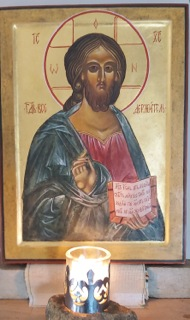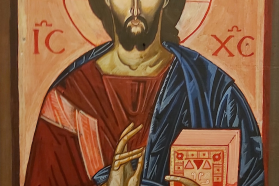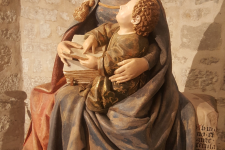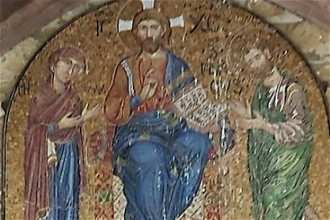Sunday Reflection with Canon Robin Gibbons - 11 April 2021

Icon by Irina Bradley
Second Sunday of Easter - Sunday of Divine Mercy - Easter Octave -
I know many Catholics love the idea of Divine Mercy Sunday, but the theologian and liturgist in me wonders a little if it does not slightly obscure the deeper meanings of the ancient festival of Holy Pascha as a continuous feast of weeks, a time out of time, a kairos period, not claimed by any single person except the Risen Christ.
For us it is a time of more than just mercy, but also the triumph of love, of the Christ over death, and our collective unity as his presence in the world as we wait in hope for the eschaton when all shall be brought together in Him. True, in our cycle of readings, the psalm of this Sunday sings of God's mercy, but the book of Acts also tells us that we belong together, the essential truth is about relationships:
"The community of believers was of one heart and mind,
and no one claimed that any of his possessions was his own,
but they had everything in common".( Acts 4:32)
Isn't this what mercy and love are also about, becoming one in Christ, the many belong together, a unity which respects our own individuality.
The Gospel pushes us further and takes us quite literally out of our locked-in comfort zone and points us outwards, towards the deep traditions of faith, particularly of the Eastern Church at this point, of course that is where I am in terms of belonging, so I cannot help but remind myself and all of you of words of St Cyril about the eighth day of the New Creation, always Sunday, but primarily for us at the moment. Easter Sunday and also that Octave Day, a celebration of two wondrous events detailed in our reading today, when the disciples were found locked in for fear of others, when the risen Christ appeared amongst them to set them free, not only physically but spiritually and mentally.
We need to note Jesus' greeting to them, words which we so desperately need too, 'peace be with you'. But perhaps we should also note carefully that even though this appearance of the Lord came accompanied with the gift of the Spirit, they don't seem to recognise what is going on, for a week later we find them locked in again. And Thomas shatters their fear by abandoning any pretence of piety instead demanding Christ allow him to come close to see proof and not rely on tales of visions! Perhaps this too should give us a warning, I am not opposed to visions, but I consider them very secondary to the aliveness, the quickening of the Word amongst and in us, that power of God, taking us out of our locked rooms and dealing with us in our various stages of belief or unbelief.
Cyril of Alexandria unlocks for me the whole reason Sunday is key to Christian tradition, which as Cyril points out lives on in us all:
'With good reason then we are accustomed to have sacred meetings in churches on the eighth day. And, to adopt the language of allegory, as the idea necessarily demands, we indeed close the doors. But Christ still visits us and appears to us all, both invisibly as God and visibly in the Body. He allows us to touch His holy Flesh and gives it to us. For through the grace of God we are admitted to partake of the blessed Eucharist, receiving Christ into our hands, to the intent that we may firmly believe that he did in truth raise up the Temple of His Body'.
This straightforward theology, linking our own faith experience to that of those with Jesus, takes us away from the extraordinary and places us back in a world that is so ordinary, we might fail to see that this, rather than external visions, is the real place of our encounter with the Risen Lord. That gospel question; "why look for him amongst the dead?' is not simply part of a narrative, it is a challenge to all of us now. This holy season is one when we rejoice in the ordinary activities of God amongst us, of the Risen Lord still here in various ways, in that glimpse which many of us have missed in lockdown, of the divine gifts of his body and blood, were when we hold and take we are both drawn close and made part of his risen presence. Here is true mercy, our gift of love, so perhaps as well as celebrating Divine Mercy Sunday we need to recover the ancient and deeper meaning of this Paschal season, for mercy is revealed in the living tradition of our communities when we too encounter Christ and hope awakens in us..
I take heart that if like Thomas I choose not to believe unless I myself experience, so be it, I am still one of many, still part of the Kingdom, called in this life to gather with others in His name, for there are so many different ways to Christ, yet only one destination. It is also so simple, somehow it is found in the song and proclamation of the Resurrection, it is by doing these things together with others that my strength is found, it is there in the common chant so loved by the `Eastern Christians: 'Christ is risen from the dead, trampling down death by death and to those in the tomb he has given life' . I will let the great Saint Athanasius have the last word for our reflection, for here he takes us deeper into the mystery of the great feast of Pascha:
'This feast guides us through the trials that meet us in this world. God now gives us the joy of salvation that shines out from this feast, as he brings us together to form one assembly, uniting us all in spirit in every place, allowing us to pray together and to offer common thanksgiving, as is our duty on the feast.
Such is the wonder of his love: he gathers to this feast those who are far apart, and brings together in unity of faith those who may be physically separated from each other.
(Saint Athanasius: The Paschal Sacrament)
Prayers for Prince Philip.
As the nation mourns the death of Prince Philip or prayers go out to the Queen who has lost her husband and consort. May he rest in peace . Amen
One of the official prayers:
A Prayer for the Duke of Edinburgh.
'Well done, thou good and faithful servant: enter thou into the joy of thy lord.' (Matthew 25.21)
God of majesty,
give rest to your servant Philip
who, having served his Queen and Country,
has passed from this life,
full of years yet strong in spirit.
As we give thanks for his life,
as Prince and husband,
as Consort and family man,
we pray that all that he has done
may continue to bear fruit
in the lives of individuals
and the life of this nation,
to your honour and glory,
through Jesus Christ our Lord. Amen.
Lectio proper:
Extract from Saint Athanasius: The Paschal Sacrament
Brethren, how fine a thing it is to move from festival to festival, from prayer to prayer, from holy day to holy day. The time is now at hand when we enter on a new beginning: the proclamation of the blessed Passover, in which the Lord was sacrificed. We feed as on the food of life, we constantly refresh our souls with his precious blood, as from a fountain.
Yet we are always thirsting, burning to be satisfied. But he himself is present for those who thirst and in his goodness invites them to the feast day. Our Saviour repeats his words: If anyone thirsts, let him come to me and drink.
He quenched the thirst not only of those who came to him then. Whenever anyone seeks him he is freely admitted to the presence of the Saviour. The grace of the feast is not restricted to one occasion. Its rays of glory never set. It is always at hand to enlighten the mind of those who desire it.
Poem Sonnet on St Thomas
Malcolm Guite
We do not know… how can we know the way?"
Courageous master of the awkward question,
You spoke the words the others dared not say
And cut through their evasion and abstraction.
Oh doubting Thomas, father of my faith,
You put your finger on the nub of things
We cannot love some disembodied wraith,
But flesh and blood must be our king of kings.
Your teaching is to touch, embrace, anoint,
Feel after Him and find Him in the flesh.
Because He loved your awkward counter-point
The Word has heard and granted you your wish.
Oh place my hands with yours, help me divine
The wounded God whose wounds are healing mine.
Fr Robin is an Eastern Rite Catholic Chaplain for Melkites in the UK. He is also an Ecumenical Canon of Christ Church Cathedral, Oxford. You can follow him on Twitter: @RobinGibbons2


















